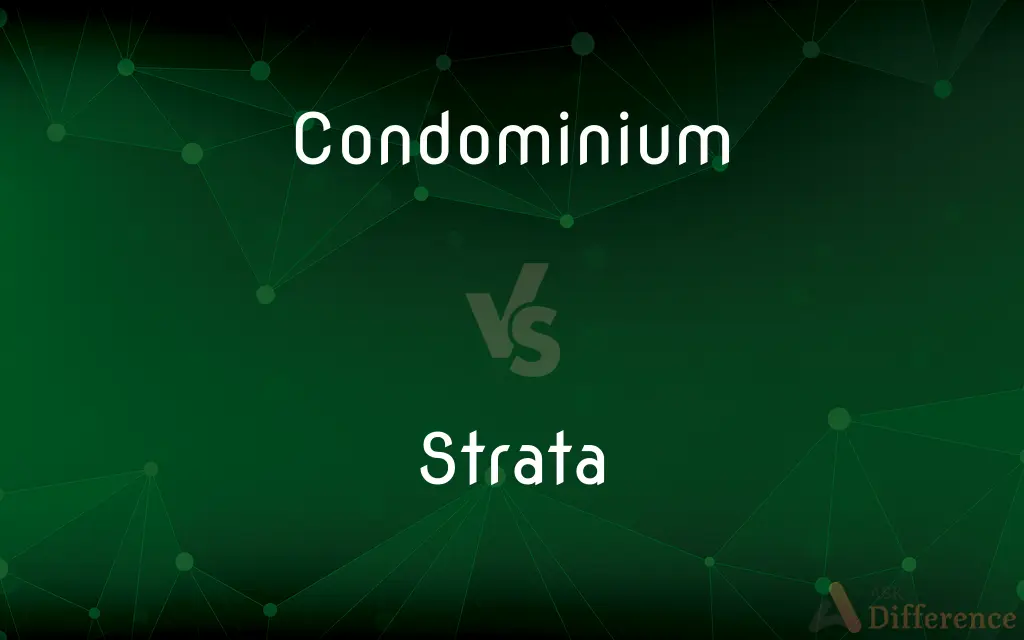Condominium vs. Strata — What's the Difference?
By Urooj Arif & Fiza Rafique — Updated on April 2, 2024
A condominium refers to individual ownership of a unit within a larger property, with shared common areas, while a strata is a system of property ownership focused on legal ownership of individual units and shared responsibility for common property.

Difference Between Condominium and Strata
Table of Contents
ADVERTISEMENT
Key Differences
Condominiums, commonly known as condos, are individual units within a larger complex where owners hold title to their specific unit. Owners share common areas such as lobbies, gyms, and pools. The management and maintenance of these common areas are typically handled by a homeowners association (HOA) that collects fees for upkeep. In contrast, strata refers to a legal system of property ownership more commonly used in countries like Canada and Australia. It similarly involves individual ownership of units within a complex and shared common areas. However, the term "strata" emphasizes the legal framework and ownership model, especially the collective ownership and responsibility for common property through a strata corporation.
While condominiums focus on the aspect of individual unit ownership within a multi-unit complex, strata schemes additionally involve a structured approach to the governance and maintenance of the building’s common property. Strata corporations, akin to HOAs in condominium settings, are responsible for the overall management of the property, but the term "strata" itself highlights the layered structure of ownership and responsibilities.
In the context of governance, condo owners are typically part of an HOA that makes decisions regarding common areas and property maintenance. On the other hand, strata properties are managed by a strata council or board, which operates under specific legislation that governs strata developments in their respective jurisdiction. This can influence the rules, regulations, and management practices of the property.
Financially, both condominium and strata property owners pay monthly fees for the upkeep of common areas and major repairs. However, the specifics of what these fees cover and how they are calculated can vary significantly between a condo association and a strata corporation, largely due to regional legislation and the particularities of the property's strata plan.
The terminology and legal implications of owning a condominium versus a strata lot can significantly impact the rights and responsibilities of owners. For instance, in a strata property, there might be more explicit legislation regarding the allocation of repair responsibilities and the governance of common property, whereas condominium laws can vary widely across different regions within the same country.
ADVERTISEMENT
Comparison Chart
Definition
Individual ownership of a unit within a complex.
Legal system of property ownership focusing on individual units and collective responsibility for common property.
Usage
Broadly used, especially in the US.
Common in Canada, Australia, and other regions with specific strata legislation.
Governance
Managed by a homeowners association (HOA).
Governed by a strata corporation or council under specific legislation.
Common Property
Owners share common areas; managed by HOA.
Collective ownership and responsibility for common property, managed by a strata corporation.
Legal Framework
Varied, depending on local laws.
Specifically defined by strata property legislation.
Compare with Definitions
Condominium
Requires payment of monthly fees.
Condominium owners pay fees that cover landscaping and common area maintenance.
Strata
Managed by a strata corporation.
The strata corporation organized a meeting to discuss upcoming property renovations.
Condominium
Governed by an association of homeowners.
The condominium's HOA meets quarterly to discuss maintenance issues.
Strata
A form of property ownership with individual units and shared common areas.
He owns a strata lot in a mixed-use development.
Condominium
A unit in a larger property owned individually.
She bought a condominium in the city's downtown area.
Strata
Involves specific legal and administrative frameworks.
Strata ownership requires adherence to both local and strata-specific laws.
Condominium
Part of a complex with shared amenities.
The condominium complex includes a swimming pool and a fitness center.
Strata
Includes payment of strata fees for property upkeep.
Owners pay monthly strata fees that contribute to the building's insurance and maintenance.
Condominium
Subject to the rules of the HOA.
The condominium's HOA has set quiet hours to ensure community peace.
Strata
Features collective decision-making for common property.
Strata lot owners voted on the proposal to upgrade the building’s security system.
Condominium
A condominium is a building structure divided into several units that are each separately owned, surrounded by common areas that are jointly owned. Residential condominiums are frequently constructed as apartment buildings, but there are also "detached condominiums", which look like single-family homes, but in which the yards (gardens), corridors, building exteriors, and streets as well as any recreational facilities (like a pool or pools, bowling alley, tennis courts, golf course, etc), are jointly owned and maintained by a community association.
Strata
A plural of stratum.
Condominium
A building or complex in which units of property, such as apartments, are owned by individuals and common parts of the property, such as the grounds and building structure, are owned jointly by the unit owners.
Condominium
A unit in such a complex.
Condominium
Joint sovereignty, especially joint rule of territory by two or more nations, or a plan to achieve it
"The allies would fear that they were pawns in a superpower condominium" (New Republic).
Condominium
A politically dependent territory.
Condominium
Joint sovereignty over a territory by two or more countries.
The Anglo-Egyptian Sudan was a condominium ruled jointly by Egypt and the United Kingdom.
Condominium
A region or territory under such rule.
Condominium
A building or complex of buildings that provides multiple residential units each of which is owned separately but whose grounds, structure, etc. (if any) are owned jointly.
Condominium
The system of ownership by which such condominiums operate
Condominium
An individual unit (such as an apartment) in such a complex.
Condominium
The legal tenure involved.
Condominium
One of the units in a condominium{2}.
Condominium
A complex of dwelling units (as an apartment house) in which each unit is individually owned (as contrasted with rented).
Condominium
One of the dwelling units in a condominium
Condominium
Housing consisting of a complex of dwelling units (as an apartment house) in which each unit is individually owned
Common Curiosities
Is strata ownership more complex than condominium ownership?
Strata ownership can involve more specific legal structures and responsibilities, especially regarding common property, which might be considered more complex depending on the jurisdiction.
Can a building be both a condominium and strata?
The terms are used in different legal contexts; a building is generally governed by the property ownership laws of its location, making it either a condominium or strata, but not both.
Are strata fees different from condominium association fees?
While both fees cover similar expenses, the specifics of what is included and how they are calculated can vary due to regional laws and the property's governing documents.
Are pets allowed in condominiums and strata properties?
Pet policies are determined by the HOA or strata bylaws and can vary widely from one property to another.
Can I rent out my condominium or strata unit?
Yes, but the rules and conditions under which you can do so may vary significantly based on the condominium's HOA or the strata corporation's bylaws.
How are major decisions made in condominiums and strata properties?
Major decisions typically require a vote among the owners, but the specific voting rights and processes can differ between condominiums and strata properties.
How does insurance work in condominiums vs. strata properties?
In both cases, the owners typically need personal insurance for their unit and belongings, while the HOA or strata corporation holds a separate policy for common areas. The specifics, however, can differ widely.
What happens if I don’t pay my condominium or strata fees?
Non-payment can lead to penalties, interest charges, and potentially legal action or a lien against your property, regardless of whether it's a condominium or strata.
Can I make changes to the exterior of my condominium or strata unit?
Exterior modifications usually require approval from the HOA or strata council to ensure they meet the community’s standards and regulations.
How is maintenance handled in condominiums vs. strata properties?
Both have mechanisms for maintaining common areas and addressing repairs, but the division of responsibilities can be different, especially for issues affecting both individual units and common property.
Share Your Discovery

Previous Comparison
Less vs. Lower
Next Comparison
Yoga vs. ExerciseAuthor Spotlight
Written by
Urooj ArifUrooj is a skilled content writer at Ask Difference, known for her exceptional ability to simplify complex topics into engaging and informative content. With a passion for research and a flair for clear, concise writing, she consistently delivers articles that resonate with our diverse audience.
Co-written by
Fiza RafiqueFiza Rafique is a skilled content writer at AskDifference.com, where she meticulously refines and enhances written pieces. Drawing from her vast editorial expertise, Fiza ensures clarity, accuracy, and precision in every article. Passionate about language, she continually seeks to elevate the quality of content for readers worldwide.












































